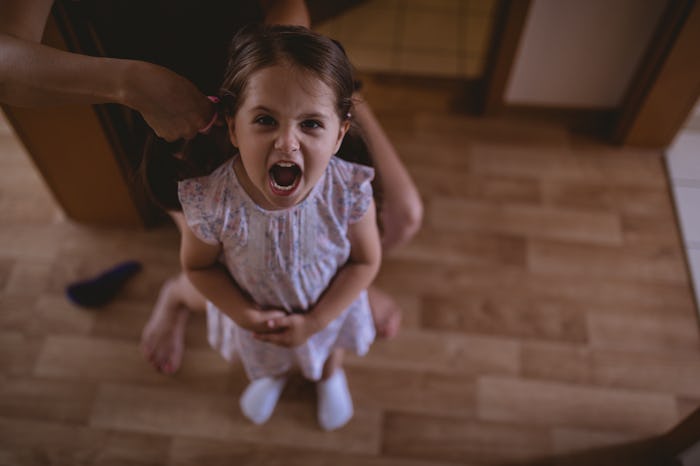Kids say the darndest things. Funny little misunderstandings, uncouth but hilarious truths, adorable mispronunciations. (Did you just call chicken nuggets "chicky nuggies?" LOL!) And sometimes kids say "I hate you!" *Record scratch* I'm sorry what?
Yep, sometime around 3 — or 4? — your child will try this out, having made the space jump to surly teenager.
Hearing "I hate you" from the person you love most in the whole world (and for whom you have endured so much) sucks. It's shocking, hurtful, disrespectful, and/or upsetting. For some of us, who question and second guess every decision we make for our children (Was this the right thing to do? Am I doing enough for them? Am I enough?) an insult like this can be particularly shattering. What do you even say to such a thing?
We could use some professional help. So I reached out to Eileen Kennedy-Moore, psychologist, author, and contributing editor of What's My Child Thinking: Practical Psychology For Modern Parents to help us process what's going on here.
Kennedy-Moore, who spoke to Romper by phone, notes that kids will often enter the "I hate you!" stage in preschool or early grade school, probably because this is where they hear their peers saying it and learn that the word "hate" holds power.
"It's the most shocking thing they can think of to say," she observes, which, of course, is exactly why they say it. "If you want your kid to say it more, have a big reaction." Showing you're upset or angry, or letting them know that their comment made you sad shows your child that their words have power for you.
But while talking about your own anger or hurt feelings is unlikely to be helpful, either in the moment or down the line, talking about their feelings may be just the ticket.
"What we need to do as parents is pay attention to the feelings not the words," says Kennedy-Moore. "Slide past the comment, acknowledge the feeling, and deal with the situation." By recognizing their anger, she continues, the child feels heard, which gives them an opportunity to calm down. This method also models a way for them to talk about their feelings in a more constructive way. (So, you know, hopefully fewer hurtful aspersions moving forward...)
OK, you think, that's great for them, but what about my hurt feelings? My baby said they hate meeeeeeeeee! Don't my feelings matter?!
"It would certainly be awful if our children hated us forever and always," Kennedy-Moore says, "but they won't. They're just angry in the moment."
So take a breath and a step back and remember that while our children's emotions are powerful, they're not permanent.
Expert:
Eileen Kennedy-Moore, psychologist, author, and contributing editor of What's My Child Thinking: Practical Psychology For Modern Parents
